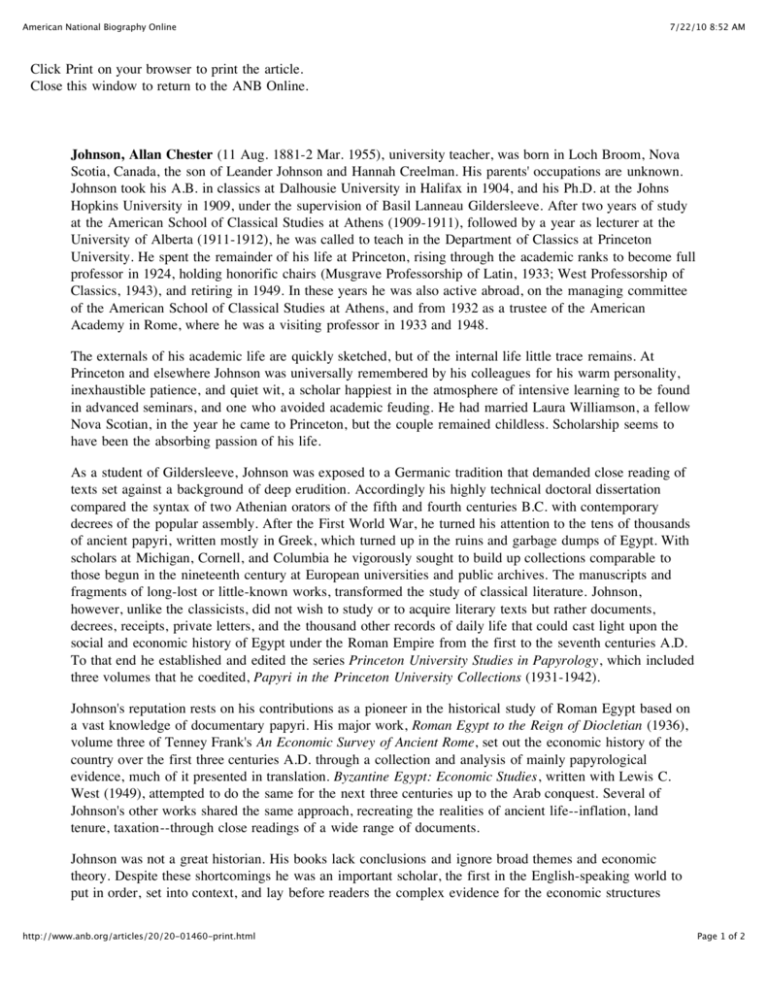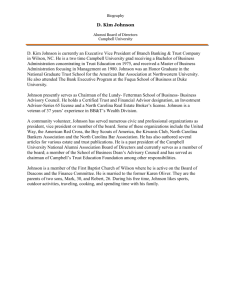
American National Biography Online
7/22/10 8:52 AM
Click Print on your browser to print the article.
Close this window to return to the ANB Online.
Johnson, Allan Chester (11 Aug. 1881-2 Mar. 1955), university teacher, was born in Loch Broom, Nova
Scotia, Canada, the son of Leander Johnson and Hannah Creelman. His parents' occupations are unknown.
Johnson took his A.B. in classics at Dalhousie University in Halifax in 1904, and his Ph.D. at the Johns
Hopkins University in 1909, under the supervision of Basil Lanneau Gildersleeve. After two years of study
at the American School of Classical Studies at Athens (1909-1911), followed by a year as lecturer at the
University of Alberta (1911-1912), he was called to teach in the Department of Classics at Princeton
University. He spent the remainder of his life at Princeton, rising through the academic ranks to become full
professor in 1924, holding honorific chairs (Musgrave Professorship of Latin, 1933; West Professorship of
Classics, 1943), and retiring in 1949. In these years he was also active abroad, on the managing committee
of the American School of Classical Studies at Athens, and from 1932 as a trustee of the American
Academy in Rome, where he was a visiting professor in 1933 and 1948.
The externals of his academic life are quickly sketched, but of the internal life little trace remains. At
Princeton and elsewhere Johnson was universally remembered by his colleagues for his warm personality,
inexhaustible patience, and quiet wit, a scholar happiest in the atmosphere of intensive learning to be found
in advanced seminars, and one who avoided academic feuding. He had married Laura Williamson, a fellow
Nova Scotian, in the year he came to Princeton, but the couple remained childless. Scholarship seems to
have been the absorbing passion of his life.
As a student of Gildersleeve, Johnson was exposed to a Germanic tradition that demanded close reading of
texts set against a background of deep erudition. Accordingly his highly technical doctoral dissertation
compared the syntax of two Athenian orators of the fifth and fourth centuries B.C. with contemporary
decrees of the popular assembly. After the First World War, he turned his attention to the tens of thousands
of ancient papyri, written mostly in Greek, which turned up in the ruins and garbage dumps of Egypt. With
scholars at Michigan, Cornell, and Columbia he vigorously sought to build up collections comparable to
those begun in the nineteenth century at European universities and public archives. The manuscripts and
fragments of long-lost or little-known works, transformed the study of classical literature. Johnson,
however, unlike the classicists, did not wish to study or to acquire literary texts but rather documents,
decrees, receipts, private letters, and the thousand other records of daily life that could cast light upon the
social and economic history of Egypt under the Roman Empire from the first to the seventh centuries A.D.
To that end he established and edited the series Princeton University Studies in Papyrology, which included
three volumes that he coedited, Papyri in the Princeton University Collections (1931-1942).
Johnson's reputation rests on his contributions as a pioneer in the historical study of Roman Egypt based on
a vast knowledge of documentary papyri. His major work, Roman Egypt to the Reign of Diocletian (1936),
volume three of Tenney Frank's An Economic Survey of Ancient Rome, set out the economic history of the
country over the first three centuries A.D. through a collection and analysis of mainly papyrological
evidence, much of it presented in translation. Byzantine Egypt: Economic Studies, written with Lewis C.
West (1949), attempted to do the same for the next three centuries up to the Arab conquest. Several of
Johnson's other works shared the same approach, recreating the realities of ancient life--inflation, land
tenure, taxation--through close readings of a wide range of documents.
Johnson was not a great historian. His books lack conclusions and ignore broad themes and economic
theory. Despite these shortcomings he was an important scholar, the first in the English-speaking world to
put in order, set into context, and lay before readers the complex evidence for the economic structures
http://www.anb.org/articles/20/20-01460-print.html
Page 1 of 2
American National Biography Online
7/22/10 8:52 AM
within which ordinary people led their lives in the Roman world. He died at Princeton.
Bibliography
Material on Johnson including some correspondence, faculty record cards, memorials, and obituaries can be
found in the Princeton University Archives. His other works include Municipal Administration in the
Roman Empire, with Frank F. Abbott (1926); Currency in Roman and Byzantine Egypt, with Louis C. West
(1944); Egypt and the Roman Empire (1951); and Ancient Roman Statutes, with Paul R. Coleman-Norton
and Frank C. Bourne (1961).
Edward Champlin
Back to the top
Citation:
Edward Champlin. "Johnson, Allan Chester";
http://www.anb.org/articles/20/20-01460.html;
American National Biography Online Feb. 2000.
Access Date: Thu Jul 22 2010 08:51:16 GMT-0400 (EDT)
Copyright © 2000 American Council of Learned Societies. Published by Oxford University Press. All rights reserved. Privacy Policy.
http://www.anb.org/articles/20/20-01460-print.html
Page 2 of 2






